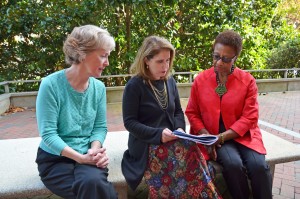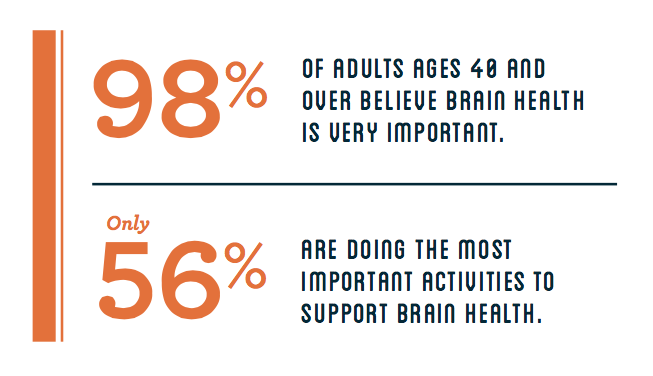The challenges of healthy aging
December 7, 2015
Globally, the number of people 60 years old and older is growing exponentially. By 2050, these individuals will constitute nearly one-quarter of the world’s population.
Identifying strategies that will allow adults to age safely and with good quality of life, to maintain their abilities and safeguard their independence is vital – and is a high priority at the UNC Gillings School of Global Public Health.

Julie MacMillan, Heather Altman and Dr. Peggye Dilworth-Anderson (L-R) review materials related to the new Global Aging and Technology Collaborative. (Photo by Linda Kastleman)
“People are aging – me included – and we need a plan to help them live fully,” says Julie MacMillan, MPH, managing director of the School’s Research and Innovation Solutions office. “At the Gillings School, through strong collaborations, we want to create opportunities for people to live as healthfully and independently as possible.”
School leaders take a three-pronged approach to meeting those needs, including innovation, evaluation and education. Partnerships through the Gillings Global GatewayTM (sph.unc.edu/global-health) offer support.
Evaluation
Identifying needs is a first step, MacMillan says.
Peggye Dilworth-Anderson, PhD, professor of health policy and management, collaborates with UNC and Cambridge University (U.K.) colleagues to reduce later-life dementia risks. Using community-based participatory research, her team explores relationships between cognitive health, protective factors and modifiable risk factors to help develop cognitive, health-sustaining interventions that can be used with vulnerable groups of older adults in the U.S. and U.K.
Dilworth-Anderson is a venerated national leader in aging issues, having served as a Presidential appointee on the White House Conference on Aging Advisory Committee (2002-2005), president of the Gerontological Society of America (2009-2010) and appointed member of the Institute of Medicine’s Forum on Aging, Disability and Independence (2012- 2014). In October 2015, she was invited by AARP, in partnership with AgeUK (ageuk.org.uk), to serve a two-year term on the governance committee of the new Global Council on Brain Health (aarp.org/gcbh). The committee includes physicians, scientists, policy experts and others who will recommend best practices regarding brain health maintenance.
Funding for some of the UNC-Cambridge initiative was provided by Drs. Dennis and Mireille Gillings. Dennis Gillings, PhD, CBE, appointed by U.K. Prime Minister David Cameron as World Dementia Envoy, leads a global council to raise funds for research toward a cure for Alzheimer’s disease and other dementias.
 Wayne Rosamond, PhD, epidemiology professor at the Gillings School and adjunct professor of emergency medicine in the UNC School of Medicine, identifies ways emergency medicine services (EMS) staff can communicate with hospitals while en route. These strategies could ensure immediate availability of emergency department resources, personnel and scanning equipment, of special importance in situations such as stroke, in which a few minutes can make a big difference in prognosis. Steve Marshall, PhD, epidemiology professor and director of the UNC Injury Prevention Research Center, and Jason Franz, PhD, biomedical engineering assistant professor, study factors that contribute to adult falls.
Wayne Rosamond, PhD, epidemiology professor at the Gillings School and adjunct professor of emergency medicine in the UNC School of Medicine, identifies ways emergency medicine services (EMS) staff can communicate with hospitals while en route. These strategies could ensure immediate availability of emergency department resources, personnel and scanning equipment, of special importance in situations such as stroke, in which a few minutes can make a big difference in prognosis. Steve Marshall, PhD, epidemiology professor and director of the UNC Injury Prevention Research Center, and Jason Franz, PhD, biomedical engineering assistant professor, study factors that contribute to adult falls.
Epidemiology postdoctoral fellow Vineet Menachery, PhD, is using a recent National Institute on Aging award to support his research on the SARS coronavirus. He is identifying changes in immune response in the context of aging that could modify treatment of older adults who develop respiratory infections, a leading cause of death in that population.
Innovation
 The Global Aging and Technology Collaborative aims to promote innovation and collaboration with global partners, says Heather Altman, MPH, project manager for the collaborative and doctoral candidate in the School’s Executive Doctor of Public Health program. The group leverages the expertise of more than 100 interdisciplinary researchers, practitioners and entrepreneurs to adopt creative, affordable and practical solutions that enhance quality of life and support people’s ability to age at home and in their communities. Altman is also Carol Woods Retirement Community’s community connections director, a long- held position that inspires and continues to enrich her work in aging at the UNC Gillings School.
The Global Aging and Technology Collaborative aims to promote innovation and collaboration with global partners, says Heather Altman, MPH, project manager for the collaborative and doctoral candidate in the School’s Executive Doctor of Public Health program. The group leverages the expertise of more than 100 interdisciplinary researchers, practitioners and entrepreneurs to adopt creative, affordable and practical solutions that enhance quality of life and support people’s ability to age at home and in their communities. Altman is also Carol Woods Retirement Community’s community connections director, a long- held position that inspires and continues to enrich her work in aging at the UNC Gillings School.
With the help of a career development award from the UNC Institute on Aging, Altman is evaluating a tool that will help leaders assess the livability of their communities for older adults.
Education
Gillings School students also learn about older adults’ challenges, including food insecurities, by working with Amanda Holliday, MS, RD, clinical assistant professor of nutrition and licensed dietitian/nutritionist.
“Living older with chronic conditions has a nutritional component,” Holliday says. “Independence is intertwined with food. We need to consider how each person will manage his or her own nutrition if s/he wants to stay at home.”

Amanda Holliday (in red) instructs students about challenges faced by older adults. (Contributed photos)
Holliday’s students investigate older adults’ struggles in several ways. They complete daily living activities in a suit that impairs hearing and eyesight. Holliday also connects students with alumni living abroad to learn how other societies care for older adults, and she helps them secure study-abroad opportunities focused on aging, such as with the National Health Service’s Universal Malnutrition Screening Initiative, in England.
Overall, MacMillan says, the School prepares students to be leaders in a number of public health arenas. “When our students get excited, they’re a powerful force, no matter what challenge they take on,” she says. “They always make us think – and make us stronger. I’m particularly proud of our students who seek solutions for the challenges of aging, because they will make a difference in all our lives – and eventually, in their own.”
–Whitney L.J. Howell
More than a dozen other Gillings School researchers are working on newly funded projects related to aging, studying topics such as sickle cell trait and chronic kidney disease in aging women, atherosclerosis risk, environmental determinants of cognitive aging, cancer treatment benefits for older adults, risks related to air pollutants and their impact upon cognitive disorders in the elderly, links between psychosocial stress and aging, and pathways to healthy aging for Filipino women.
Researchers and their studies
.
Linda Adair, PhD, professor of nutrition, received a grant for “Multidimensional pathways to healthy aging among Filipino women” in the amount of $531,431.
Allison Aiello, PhD, professor of epidemiology, received a grant for “Infectious Links Between Psychosocial Stress and Aging (R01AG-040115)” in the amount of $129,778; she also received two grants for “Life Course Socioeconomics, Acculturation, & Type-2 Diabetes Risk Among Latinos (R01DK087864-01A1)” in the total amount of $706,149.
Nora Franceschini, MD, MPH, research associate professor of epidemiology, received a grant for “APOL1, sickle cell trait and chronic kidney disease in aging women” in the amount of $60,610.
Jennifer Lund, PhD, assistant professor of epidemiology, received a grant for “Evaluating heterogeneity of cancer treatment benefits among older adults” in the amount of $100,000.
Cass Miller, PhD, Okun Distinguished Professor of environmental sciences and engineering, received a grant for “Thermodynamically Constrained Averaging Theory for Multiscale Systems” in the amount of $172,681.
Kari North, PhD, professor of epidemiology, received a grant for “Genetic Epidemiology of Causal Variants Across the Life Course Phase 2” in the amount of $745,378; she also received a grant for “Leveraging ancestral diversity to map adiposity loci in Hispanics” in the amount of $722,187.
Barry Popkin, PhD, W. R. Kenan, Jr. Distinguished Professor of nutrition, received a grant for “Monitoring Social Change: Health, Reproduction, Aging” in the amount of $2,312,656.
Marc Serre, PhD, associate professor of environmental sciences and engineering, received a grant for “Particulate Air Pollutants, Risk of Cognitive Disorders and Neuropathology in the Elderly” in the amount of $12,691.
Til Stürmer, MD, PhD, professor of epidemiology, received a grant for “Heat Waves, Medication Use, and Adverse Health Outcomes Among Older Adults” in the amount of $123,006; he also received a grant for “Propensity Scores and Preventive Drug Use in the Elderly” in the amount of $320,367.
William Vizuete, PhD, associate professor of environmental sciences and engineering, received a grant for “Environmental Determinants of Cognitive Aging in the WHI Memory Study” in the amount of $72,900.
Lisa Wruck, PhD, clinical associate professor of biostatistics, received two grants for “Atherosclerosis Risk in Communities (ARIC) PET Ancillary Study” in the total amount of $37,932; she also received a grant for “Planning a trial of hearing rehabilitative treatment to reduce cognitive decline” in the amount of $51,940.
Hongtu Zhu, PhD, professor of biostatistics, received a grant for “Statistical Analysis of Biomedical Imaging Data in Curved Space” in the amount of $391,262.
Carolina Public Health is a publication of the University of North Carolina at Chapel Hill Gillings School of Global Public Health. To view previous issues, please visit sph.unc.edu/cph.
